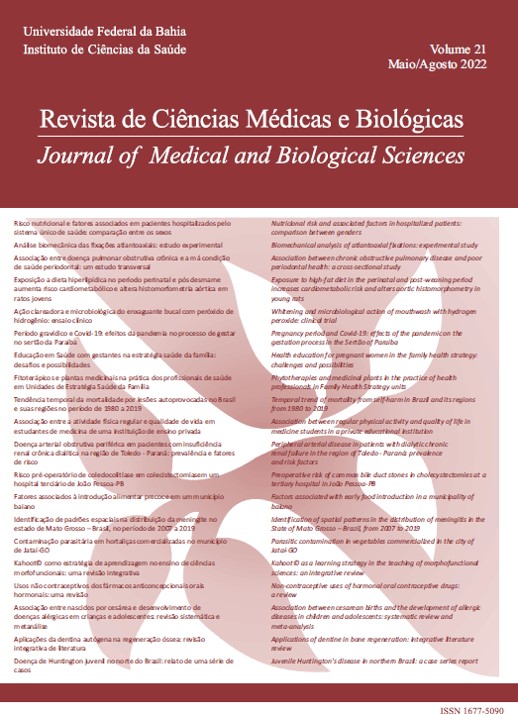Factors associated with early food introduction in a municipality of baiano
DOI:
https://doi.org/10.9771/cmbio.v21i2.49148Keywords:
Child Health;, Infant Nutrition;, Exclusive Breast Feeding;, Weaning;, Primary Health Care.Abstract
Introduction: The early introduction of food is a frequent practice in Brazil, involved by several factors of social, cultural, economic, family, emotional, as well as related to living conditions and health care. Objective: To identify the main factors associated with the early introduction of food in children from zero to six months of life, attended in primary health care in a municipality in southwestern Bahia. Methodology: Cross-sectional study, conducted with 75 mothers and children assisted in the health network of Jequié, Bahia, in the period from March to August 2018. Poisson Regression with Robust variance was employed to evaluate the association. Results: The prevalence of early food introduction in the study population was 64%, with cow's milk, water/tea and infant formula being the most prevalent foods. It was observed that the variable pacifier use (PR = 1.21; 95%CI = 1.02-1.43) showed a positive association with early feeding, while the variables bottle use (PR = 0.08; 95%CI = 0.02-0.28) and breastfeeding orientation (PR = 0.77; 95%CI = 0.63-0.95) showed a negative and inverse association with the studied outcome. Conclusion: Despite the superiority of breast milk over other forms of feeding children under six months of age, the results of this study revealed a high prevalence of early introduction of food in the studied population and its association with the use of pacifiers. It is suggested that actions to promote and protect exclusive breastfeeding take place since the prenatal period, also highlighting the risks of introducing food early.
Downloads
Downloads
Published
How to Cite
Issue
Section
License
Copyright (c) 2022 Journal of Medical and Biological Sciences

This work is licensed under a Creative Commons Attribution 4.0 International License.
The Journal of Medical and Biological Sciences reserves all copyrights of published works, including translations, allowing, however, their subsequent reproduction as transcription, with proper citation of source, through the Creative Commons license. The periodical has free and free access.


